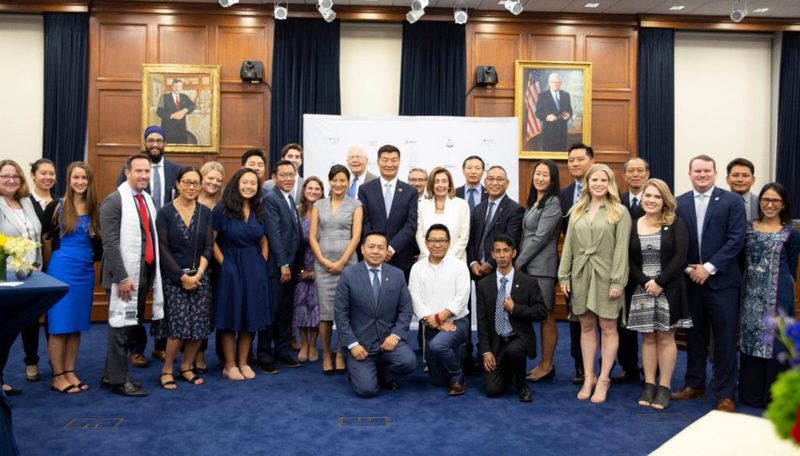Washington D.C — President of the Tibetan-government-in-exile Dr Lobsang Sangay Monday met with Nancy Pelosi, Speaker of the United States House of Representatives and several other members of Congress and discussed Tibet-related issues.
The Tibetan President arrived in Washington D.C., the capital of United States this Monday for a series of meetings to discuss the new Tibet Policy Act and to highlight the importance of religious freedom for the reincarnation process. The Office of Tibet, Washington D.C said the U.S. House Democratic Partnership hosted a reception in honor of Sikyong Dr Lobsang Sangay, in the Rayburn House at the U.S. House of Representatives in the Capitol Hill.
"Dr Sangay attended a reception hosted at the Rayburn House—the first reception ever hosted for the Central Tibetan Administration. It was hosted by the House Democratic Partnership, and it was attended largely by the Dharamshala delegation," the Office of Tibet said, adding: "Attendants included HDP Chair Congressman David Price, Congresswoman Judy Chu, Congresswoman Terri Sewell, Congressman Ted Yoho, Congressman Gerry Connolly, and Carl Gershman, the president of the National Endowment for Democracy."
The president of the National Democratic Institute, the Vice President of the International Republican Institute, and the Vice President of the United States Agency for International Development also spoke at the meeting. Presidents of the Tibetan Association of NY, Philadelphia, and Capitol area, Vice President of International Campaign for Tibet, all the staffers of the Office of Tibet – DC, and many other Congressional staffers attended the event.
The Tibetan President gave a speech stating his thanks for those who organized the event and praised His Holiness the Dalai Lama’s past and current leadership as a compassionate and forward-thinking icon. He joked that His Holiness had his longest lunch ever with the Dharamshala delegation.
The U.S. House Speaker Nancy Pelosi came to the reception immediately after a house vote and gave a riveting speech about her support for Tibet, His Holiness the Dalai Lama, and the Central Tibetan Administration. She shared fond memories of her time with His Holiness and also sorrowful moments when she witnessed Tibetan refugees recount the human rights violations in Tibet because of the Chinese government.
Speaker Pelosi said she would help make the new Tibet Policy Act a priority in Congress. She stated that the United States loses all moral authority if they fail to stand up against China.
Sikyong or President earlier in the day met with Congressman Jim McGovern, the chairman of the Congressional-Executive Commission on China, and Jon Stivers, the staff director of the CECC. They discussed the new Tibet Policy Act, which will be announced formally within a few weeks.
The communist-totalitarian state of China began their invasion of Tibet in 1949, reaching complete occupation of the country in 1959. Since that time, more than 1.2 million people, 20% of the nation's population of six million, have died as a direct result of China's invasion and occupation. In addition, over 99% of Tibet's six thousand religious monasteries, temples, and shrines, have been looted or decimated resulting in the destruction of hundreds of thousands of sacred Buddhist scriptures.
Until 1949, Tibet was an independent Buddhist nation in the Himalayas which had little contact with the rest of the world. It existed as a rich cultural storehouse of the Mahayana and Vajrayana teachings of Buddhism. Religion was a unifying theme among the Tibetans -- as was their own language, literature, art, and world view developed by living at high altitudes, under harsh conditions, in a balance with their environment.


![Tibet has a rich history as a sovereign nation until the 1950s when it was invaded by China. [Photo: File]](/images/stories/Pics-2024/March/Tibet-Nation-1940s.jpg#joomlaImage://local-images/stories/Pics-2024/March/Tibet-Nation-1940s.jpg?width=1489&height=878)
















